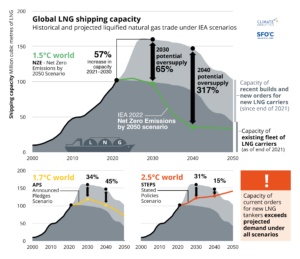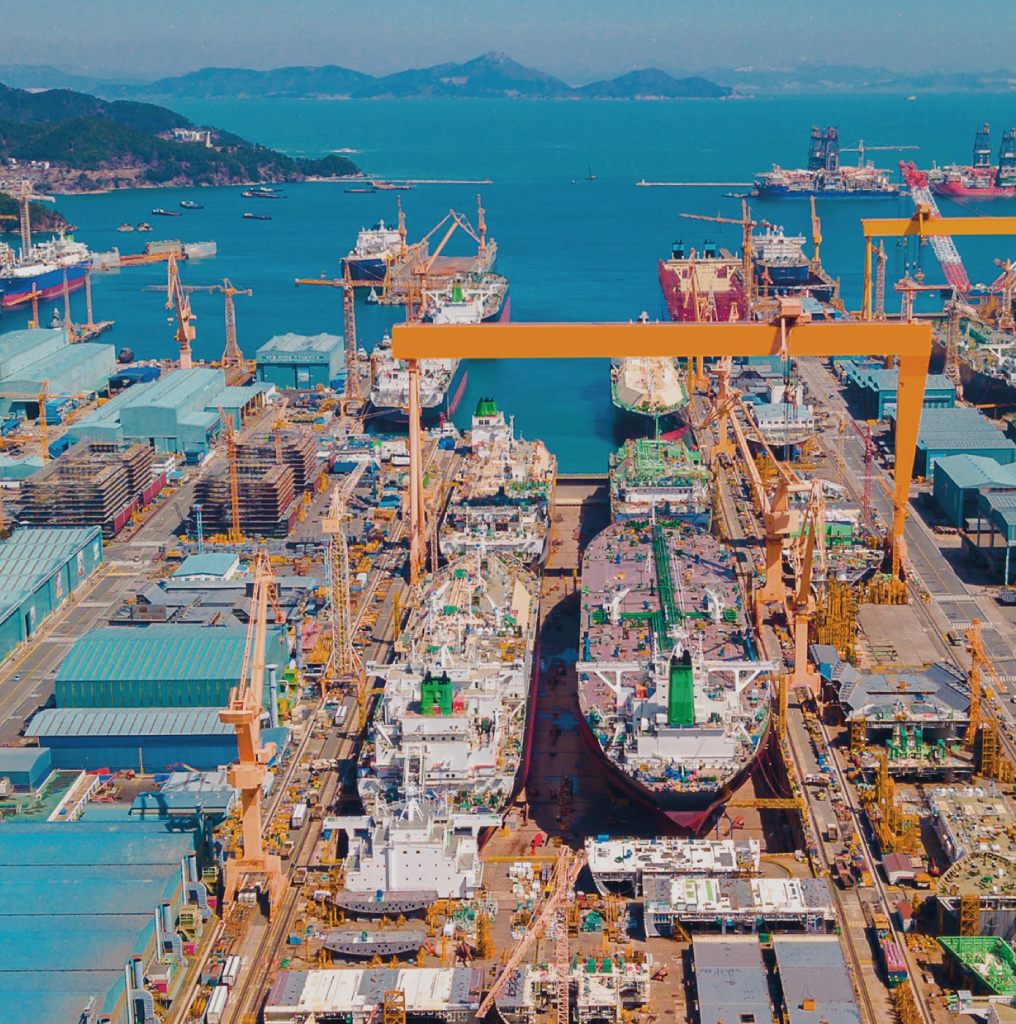FOR IMMEDIATE RELEASE
Contact:
Euijin Kim, Solutions for Our Climate, euijin.kim@forourclimate.org
Cindy Baxter, Climate Analytics, cindybax@gmail.com
Nicole Rodel, Oil Change International, nicole@priceofoil.org
Shipbuilders likely to face major losses if they expand LNG capacity, new study finds
Shipbuilders lured by a temporary bull market will likely be left stranded as the world transitions away from fossil fuels
Shipbuilders face significant risk by overshooting liquefied natural gas (LNG) shipping capacity that is inconsistent with future energy scenarios, according to a new report released today by Climate Analytics and Solutions for Our Climate.
The report finds that the uptake in shipping capacity far exceeds global forecasts of LNG trade as the world transitions away from fossil fuels to limit global warming to 1.5°C, and that the LNG shipbuilding business could become stranded under the International Energy Agency (IEA)’s net-zero scenario.
“To avoid the worst damages from climate change, the world is moving towards decarbonizing the global economy, a transition that requires us to drastically reduce our reliance on fossil fuels over the next 10-20 years,” said report author, Climate Analytics analyst Dr. Victor Maxwell.
“This means the massive number of new LNG carriers the shipbuilding industry is set to deliver this decade will not be needed and are very likely to become stranded assets.”

Figure 1: Global LNG shipping capacity against LNG trade volumes, historic and forecast.
In 2022, 34 LNG carriers were added to the global fleet, and 335 LNG carriers are expected to be added between 2023 and 2028, according to data from Clarkson Research. This surge in orders was largely driven by the oil and gas industry’s dash for LNG following Russia’s invasion of Ukraine.
However, under growing pressure to decarbonize, governments around the world have announced pledges and adopted policies that would render much of the new LNG vessels useless, warn experts.
The findings are especially relevant to South Korea, which dominates the global LNG shipbuilding industry. In 2022, Korean shipbuilders won over 70 percent of LNG carrier vessel orders.
“The risk is imminent for Korean shipbuilders who are highly reliant on building hundreds of LNG carriers that a net-zero world will not need, and that they may not even be paid for,” said Dongjae Oh, the oil and gas finance program lead at Solutions for Our Climate.
In the 2010s, Korean shipbuilders faced major financial challenges after oil prices slumped following the recession, and vessel owners began pulling out of contracts or delaying delivery and payment of drillships and offshore oil and gas production facilities.
Despite the high stranded asset risk of LNG carriers, South Korean shipbuilders are looking at a wave of newbuilding orders from oil and gas companies that are doubling down on their fossil fuel business. Currently, QatarEnergy and South Korean shipbuilders are discussing an order of up to 40 new LNG carriers for delivery in 2027.
The French oil and gas major TotalEnergies is also resuming the highly controversial Mozambique LNG project, which was halted in 2021 due to escalating conflicts in the region. The company and Korean shipbuilders are looking to sign contracts for an order of 17 LNG carriers in July.
If built, the global LNG shipping capacity will further exceed IEA’s forecast of LNG trade. This poses particular risk for financial institutions that provide loans and underwriting to the capital-intensive shipbuilding industry.
Between 2011 and 2020, South Korean public financiers provided a total of USD 127 billion to the oil and gas industry. Of this, 46 percent went towards the construction of oil and gas-related shipbuilding – including offshore oil and gas production facilities and LNG carriers.
“To avoid jeopardizing the 1.5C global warming limit as well as stranded assets, it is critical that Korea and other countries stop financing new fossil fuel infrastructure. Countries like the United Kingdom, France and Canada are already showing that this can be done,” said Laurie van der Burg, manager of the Global Public Finance team at Oil Change International.
“This presents an important opportunity to shift billions towards the renewable energy solutions that can best deliver on economic development, energy security, and climate goals.”
###
Solutions for Our Climate (SFOC) is a South Korea-based group that advocates for stronger climate policies and reforms in power regulations. SFOC is led by legal, economic, financial, and environmental experts with experience in energy and climate policy and works closely with policymakers.???
Climate Analytics is a global climate research institute that delivers cutting-edge science, analysis and support to accelerate climate action to limit warming below 1.5°C.
Oil Change International is a research, communications, and advocacy organization focused on exposing the true costs of fossil fuels and facilitating the coming transition towards clean energy.

